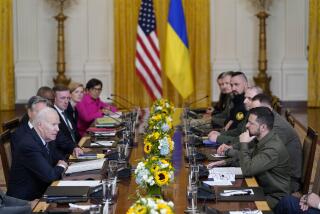U.S. Part of Year’s Gulf Cost Put at $7.5 Billion
- Share via
WASHINGTON — Defense Secretary Dick Cheney told a Senate committee Tuesday that a yearlong military presence in the Persian Gulf would cost the United States $7.5 billion in fiscal 1991--enough to wipe out most of the post-Cold War “peace dividend” that Congress had hoped to achieve in the year that begins Oct. 1.
In testimony before the Senate Armed Services Committee, Cheney estimated that the United States could persuade its allies to pick up half the tab, which he said could total $15 billion in fiscal 1991.
That was not enough to satisfy members of the panel, who repeatedly told Cheney that they believe the allies should pay more than they have thus far indicated they are willing to contribute. They aimed their harshest criticism at West Germany and Japan, which they said are making relatively small contributions despite the fact that their robust economies are particularly dependent upon Persian Gulf oil.
“It’s the lives of American boys who are at risk here--not Japanese and not German,” said Sen. John McCain (R-Ariz.). “We should at least be able to expect them to pick up a significant share of the burden.”
Others noted that oil-producing countries in the Middle East are enjoying a huge surge in revenues as a result of the crisis and contended that they should be forced to contribute a greater portion of those earnings to an effort that is aimed at guaranteeing their own security.
If the military operation continues through the fiscal year and Cheney’s cost estimate proves accurate, the commitment would significantly dampen expectations that the U.S. government would have big military savings from the recent thaw in relations with its old superpower adversary, the Soviet Union. Many in Congress had hoped that they could apply the windfall--known as the “peace dividend”--to deficit reduction or to pressing social concerns such as education.
While Democrats hope to preserve the peace dividend by forcing allies to pick up a greater share of the costs of the Persian Gulf operation, the Administration clearly hopes that Operation Desert Shield has given it leverage to stave off deep defense cuts.
Tuesday’s testimony by Cheney and Gen. Colin L. Powell, chairman of the Joint Chiefs of Staff, was the Pentagon’s first formal presentation on Capitol Hill since the crisis began.
The actual size of next year’s defense budget is a critical issue before congressional and White House negotiators as they struggle to agree on a budget only three weeks before the start of the fiscal year.
The Senate, for example, had passed a bill shortly after Iraq’s Aug. 2 invasion of Kuwait that envisioned trimming $10 billion from current levels of spending, adjusted for inflation. Armed Services Committee Chairman Sam Nunn (D-Ga.) noted in an interview that Cheney’s forecast suggested that the additional costs of the Persian Gulf operation would eliminate three-quarters of that savings.
The House is debating legislation that projects even deeper cuts--slashing $24 billion in long-range spending commitments from President Bush’s request, including a $12-billion reduction in 1991 outlays.
Pentagon spokesman Pete Williams charged Tuesday that the pending House bill would “greatly complicate” Operation Desert Shield and “increase the potential” for other regional flare-ups to turn into major crises.
“This proposal, in summary, is simply isolationist and extreme,” Williams asserted at the daily Pentagon briefing of reporters.
The Pentagon’s primary objections to the House bill center on a proposed 130,000-troop reduction, termination of the B-2 Stealth bomber program and slashes in “Star Wars” anti-missile research, the C-17 cargo plane, the A-12 carrier-based attack plane and the Advanced Tactical Fighter.
Williams said the magnitude of the troop reduction “would pose an undue risk to national security, greatly complicate the department’s ability to deal with our current crisis in the gulf and also rob the department of the flexibility that we need to manage the (troop) drawdown in an effective, responsible way.”
The Pentagon also protested the bill’s provision to permanently base most troops in the United States and rotate them on temporary duty to posts abroad.
House Armed Services Committee Chairman Les Aspin (D-Wis.) defended the bill, saying his committee had drafted it in a “fiscally responsible manner. Some adjustments are required, but nothing that has occurred in the gulf has called into question the wisdom of the approach the committee took in July.”
Further, he contended that the gulf crisis only emphasizes the wisdom of the House bill’s spending priorities, which favor lighter tanks and improved sea lift and airlift capacity over high-tech equipment more suited to a superpower war.
House Majority Leader Richard A. Gephardt (D-Mo.) added: “We can and will afford weapons critical to efforts like Operation Desert Shield: tanks, precision missiles and fast sea lift. But ‘Star Wars,’ the B-2 bomber and the MX missile are costly systems designed for a Cold War that we already won.”
More to Read
Get the L.A. Times Politics newsletter
Deeply reported insights into legislation, politics and policy from Sacramento, Washington and beyond. In your inbox twice per week.
You may occasionally receive promotional content from the Los Angeles Times.










